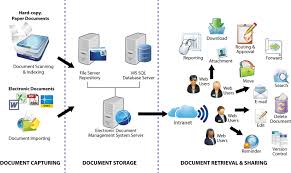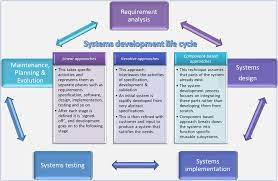Maximizing Efficiency: The Power of Cloud-Based Document Management
The Benefits of Cloud-Based Document Management
In today’s digital age, managing documents efficiently is crucial for businesses of all sizes. Cloud-based document management systems have revolutionized the way organizations handle their information. Instead of traditional paper-based methods or on-premises servers, cloud-based solutions offer numerous advantages that streamline processes and enhance collaboration.
Accessibility and Flexibility
One of the key benefits of cloud-based document management is the ability to access files from anywhere with an internet connection. This flexibility allows employees to work remotely, access important documents on-the-go, and collaborate in real-time without being tied to a specific location or device.
Cost-Effectiveness
Implementing a cloud-based document management system eliminates the need for physical storage space and reduces costs associated with printing, copying, and maintaining paper documents. Additionally, cloud solutions typically operate on a subscription basis, allowing businesses to scale their usage according to their needs without large upfront investments.
Data Security and Backup
Cloud-based document management systems offer robust security features such as encryption, access controls, and regular backups to protect sensitive information from unauthorized access or loss. Data stored in the cloud is often more secure than traditional on-premises storage due to advanced security protocols implemented by service providers.
Collaboration and Version Control
Collaboration is made seamless with cloud-based document management systems as multiple users can work on the same document simultaneously. Version control features ensure that everyone is working on the latest version of a file, reducing errors and confusion that may arise from outdated information.
Scalability and Integration
Cloud solutions are highly scalable, allowing businesses to expand their storage capacity or add new features as their needs evolve. Integration with other software applications such as customer relationship management (CRM) systems or project management tools further enhances efficiency by streamlining workflows and data sharing.
Conclusion
In conclusion, cloud-based document management offers a multitude of benefits that empower organizations to manage their information effectively in today’s fast-paced business environment. By leveraging the accessibility, cost-effectiveness, security, collaboration capabilities, scalability, and integration options provided by cloud solutions, businesses can optimize their document workflows and drive productivity across teams.
5 Essential Tips for Effective Cloud-Based Document Management
- Ensure data security by using encryption and access controls.
- Regularly back up your documents to prevent data loss.
- Implement version control to track changes and updates made to documents.
- Train employees on proper use of the cloud document management system to maximize efficiency.
- Integrate with other business tools for seamless workflow and collaboration.
Ensure data security by using encryption and access controls.
To enhance data security in cloud-based document management, it is vital to implement robust measures such as encryption and access controls. Encryption helps protect sensitive information by encoding data in a way that only authorized users can decipher, adding an extra layer of security against potential breaches. Access controls allow administrators to define who can view, edit, or share specific documents, ensuring that confidential data remains protected and only accessible to authorized personnel. By prioritizing encryption and access controls, organizations can safeguard their documents effectively in the cloud environment.
Regularly back up your documents to prevent data loss.
Regularly backing up your documents is a crucial aspect of effective cloud-based document management. By creating routine backups, you can safeguard your data against unexpected events such as system failures, cyber attacks, or accidental deletions. Ensuring that your documents are securely stored in multiple locations not only mitigates the risk of data loss but also provides peace of mind knowing that your valuable information is protected and easily recoverable when needed.
Implement version control to track changes and updates made to documents.
Implementing version control in a cloud-based document management system is essential for tracking changes and updates made to documents. By maintaining a history of revisions, users can easily review past edits, compare different versions, and identify who made specific changes. Version control not only enhances collaboration by ensuring everyone is working on the most recent document iteration but also provides a reliable audit trail for accountability and compliance purposes. This feature promotes accuracy, transparency, and efficiency in document management processes.
Train employees on proper use of the cloud document management system to maximize efficiency.
Training employees on the proper use of the cloud document management system is essential to maximize efficiency within an organization. By providing comprehensive training sessions, employees can learn how to leverage the system’s features effectively, ensuring that documents are stored, accessed, and shared efficiently. Proper training also helps in promoting best practices for data security, version control, and collaboration, ultimately leading to improved productivity and streamlined workflows across teams. Investing in employee training demonstrates a commitment to harnessing the full potential of cloud-based document management solutions for enhanced organizational success.
Integrate with other business tools for seamless workflow and collaboration.
To enhance workflow efficiency and foster seamless collaboration, it is recommended to integrate cloud-based document management systems with other essential business tools. By integrating document management with tools such as project management software, customer relationship management (CRM) systems, or communication platforms, organizations can streamline processes, facilitate information sharing, and ensure that all team members have access to up-to-date data. This integration not only improves productivity but also promotes better coordination and communication among team members, ultimately leading to more effective and agile business operations.












